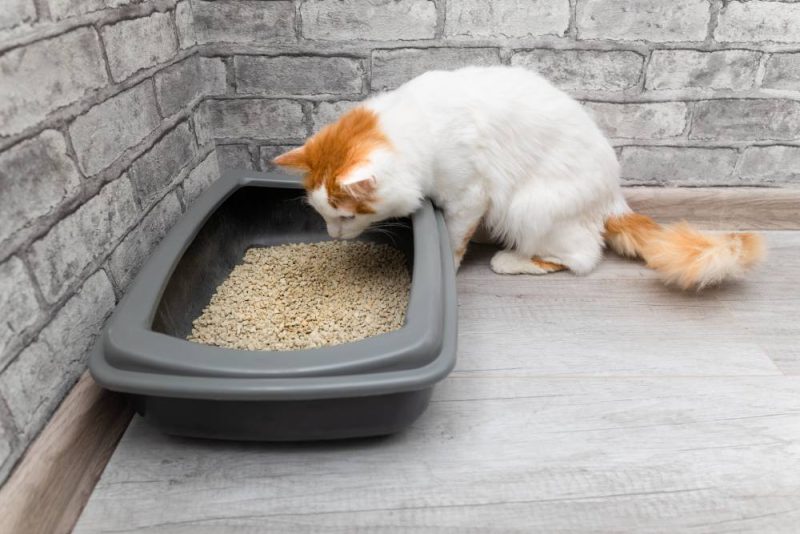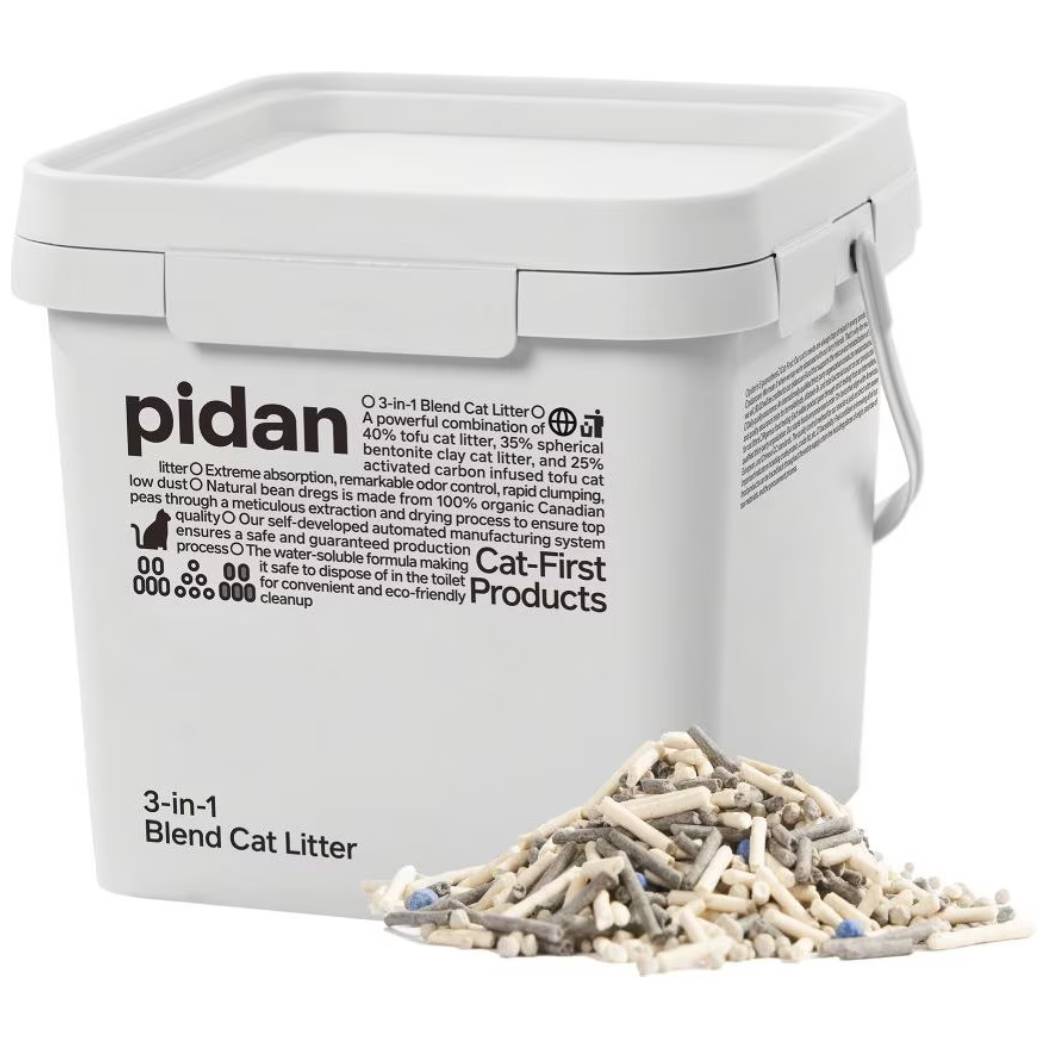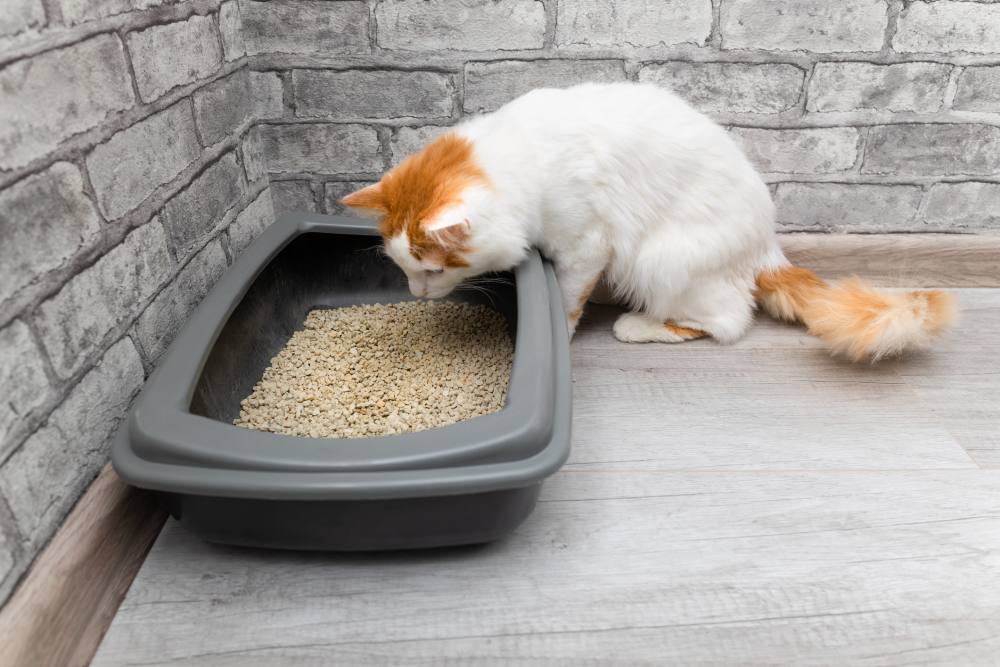
In this guide, we’ll list the best non-clay cat litter products to help you make an informed decision about what type is best for you and your cat’s needs. We’ve ranked these cat litter brands based on consumer reviews to give you a full-on view of the good and bad, so let’s have a look.
A Quick Comparison of Our Favorites in 2024
| Image | Product | Details | ||
|---|---|---|---|---|
| Best Overall |
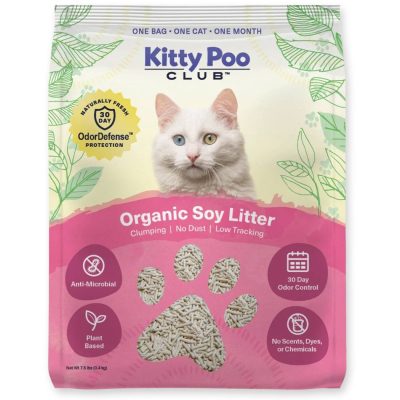
|
Kitty Poo Club |
|
CHECK PRICE |
| Budget Buy |
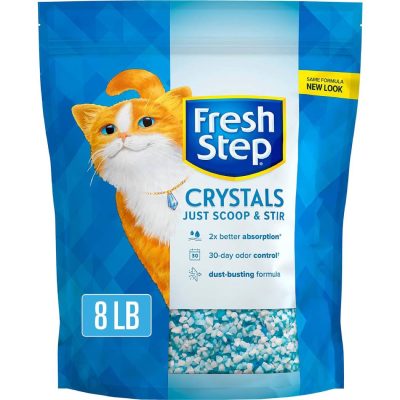
|
Fresh Step Fresh Scented Non-Clumping Crystal Cat Litter |
|
CHECK PRICE |
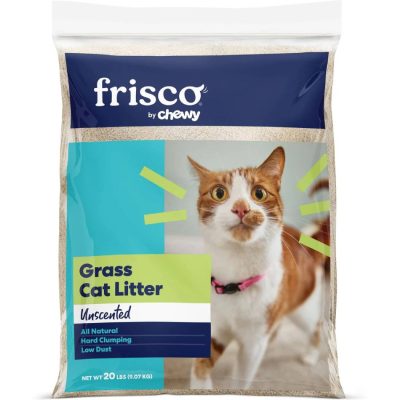
|
Frisco Natural Unscented Clumping Grass Cat Litter |
|
CHECK PRICE | |
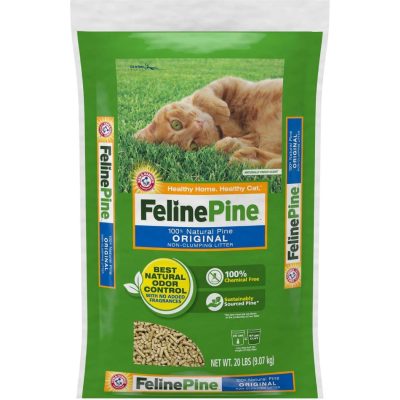
|
Feline Pine Original Non-Clumping Wood Cat Litter |
|
CHECK PRICE | |
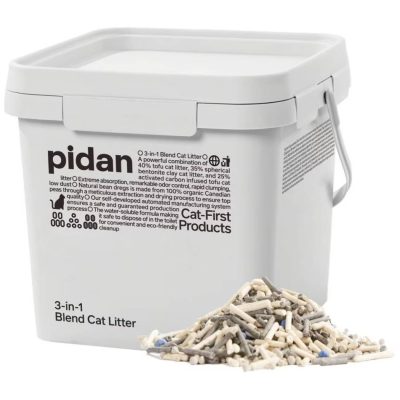
|
Pidan 3-in-1 Blend Cat Litter |
|
CHECK PRICE |
The 10 Best Non-Clay Cat Litters
1. Kitty Poo Club – Best Overall
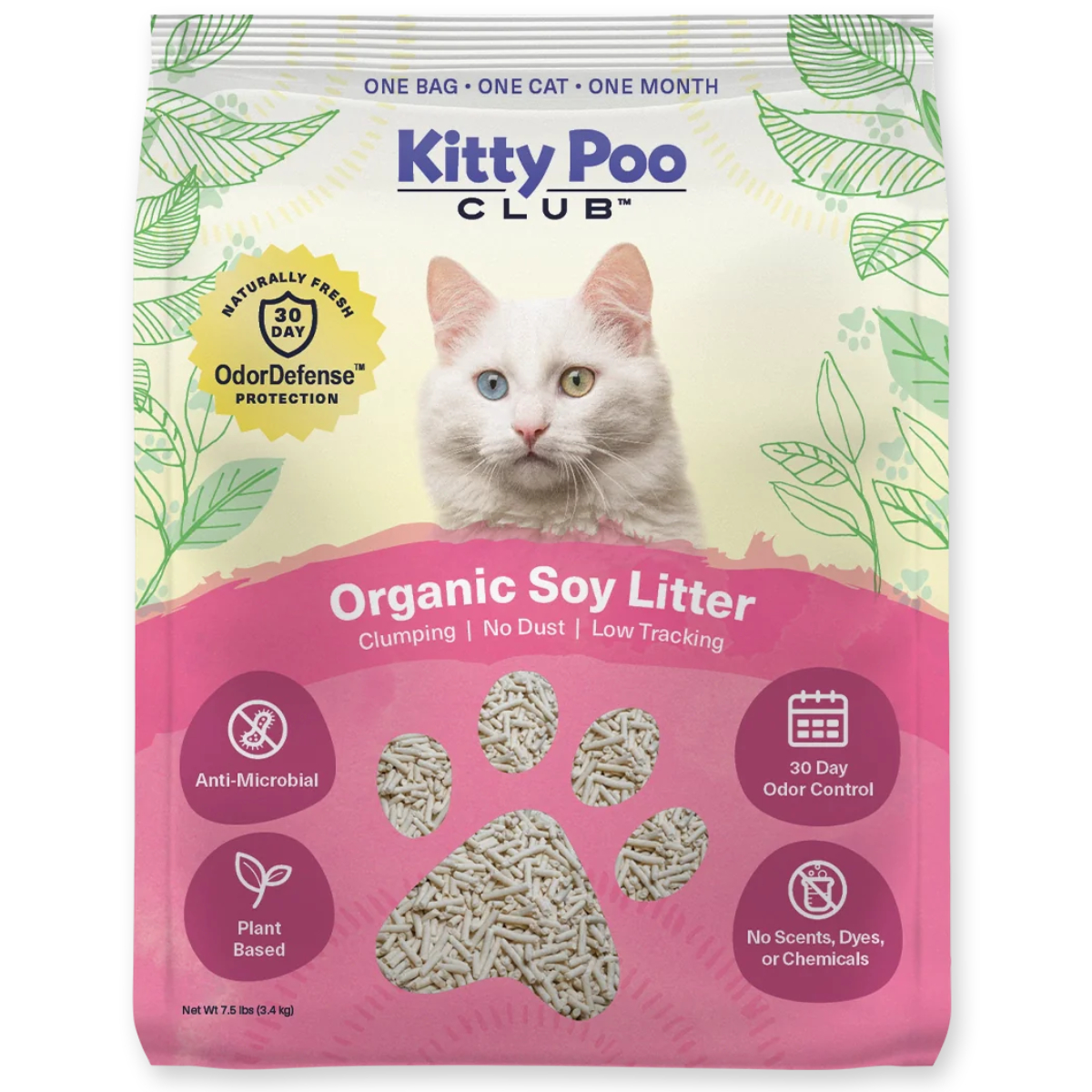
| Litter material: | Silica, organic soy, corn & wheat, or clay |
| Litter feature: | Natural ingredients |
We’ll start our list off with Kitty Poo Club cat litter. This company offers several cat litter options to suit your needs, and given the quality of the products, we feel this company deserves our best overall non-clay cat litter spot. This company uses all-natural ingredients without dyes, chemicals, or scents to create a safe, low-dust, low-tracking cat litter with 30-day odor control. Their cat litter is biodegradable, anti-microbial, hypoallergenic, and non-clumping, making cleaning the litter box a cinch. You can choose from silica, fine-grain silica, corn and wheat, organic soy, and clay.
Another excellent feature is the litter is delivered right to your door every 30 days when you sign up for a subscription. They even offer free shipping! The only downfall is that this brand is a little pricier than most, but once you factor in the all-natural, eco-friendly ingredients and free delivery, you may find the price worth the expense.
- All-natural ingredients
- Low-dust and low-tracking litters
- Biodegradable
- Free shipping
- 30-day odor control
- Expensive
2. Fresh Step Fresh Scented Non-Clumping Crystal Cat Litter – Budget Buy
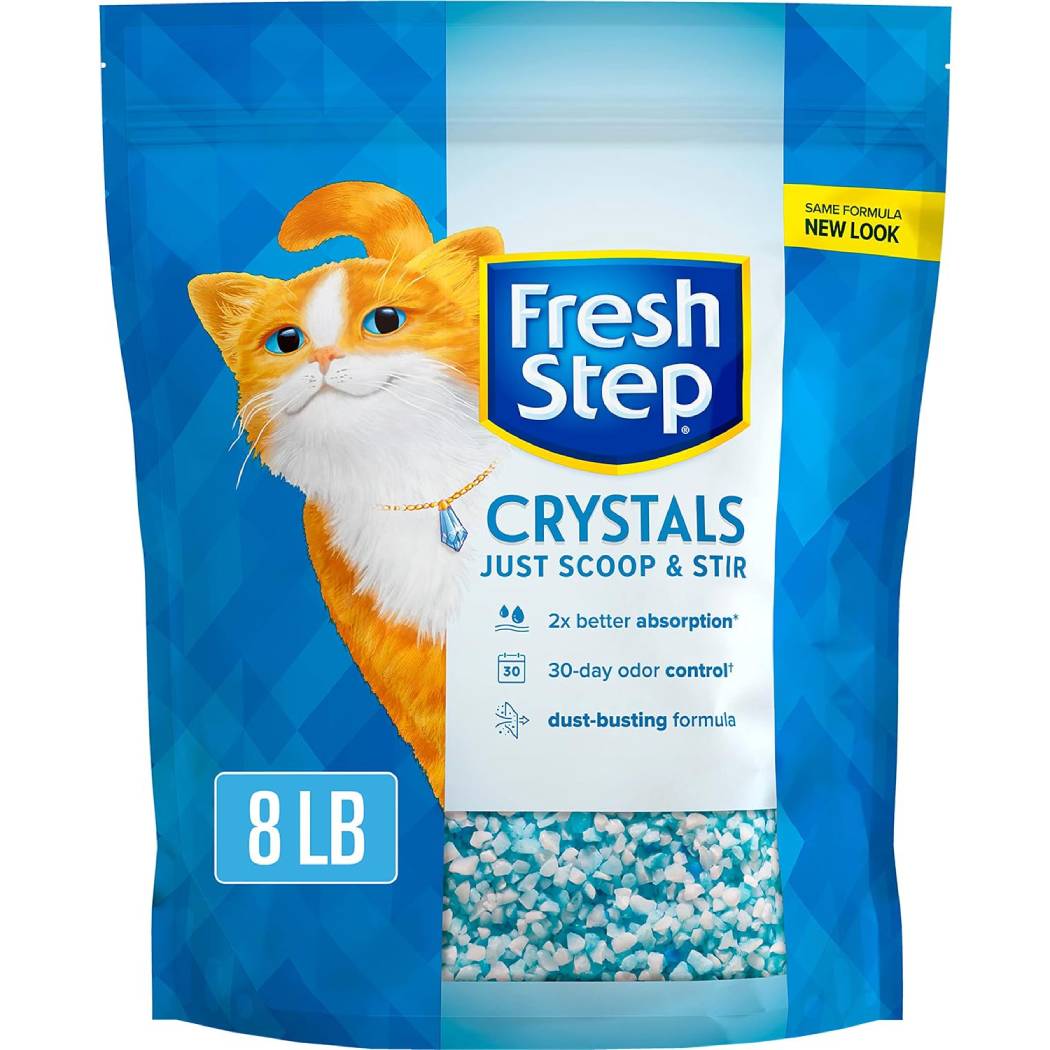
| Litter material: | Crystal |
| Litter feature: | Odor-locking |
Fresh Step Fresh Scented Non-Clumping Crystal Cat Litter offers odor-locking control using odor-locking crystals to keep your cat’s litter box smelling fresh and clean for up to 30 days. This cat litter is lightweight, soft, and gentle on your cat’s paws. This crystal formula helps minimize dust and does an excellent job of absorbing moisture on contact. The crystals are easy to scoop, which helps keep the litter box clean and fresh. It also contains a dust-busting formula to keep dust to a minimum.
It comes in an 8-pound bag at a reasonable price, making it our pick for the best non-clay cat litter for the money. A negative to this litter, however, is it does not offer low tracking.
- Odor-locking control
- Lightweight
- Dust-busting formula
- Easy to scoop
- Not a low-tracking option
3. Frisco Natural Unscented Clumping Grass Cat Litter
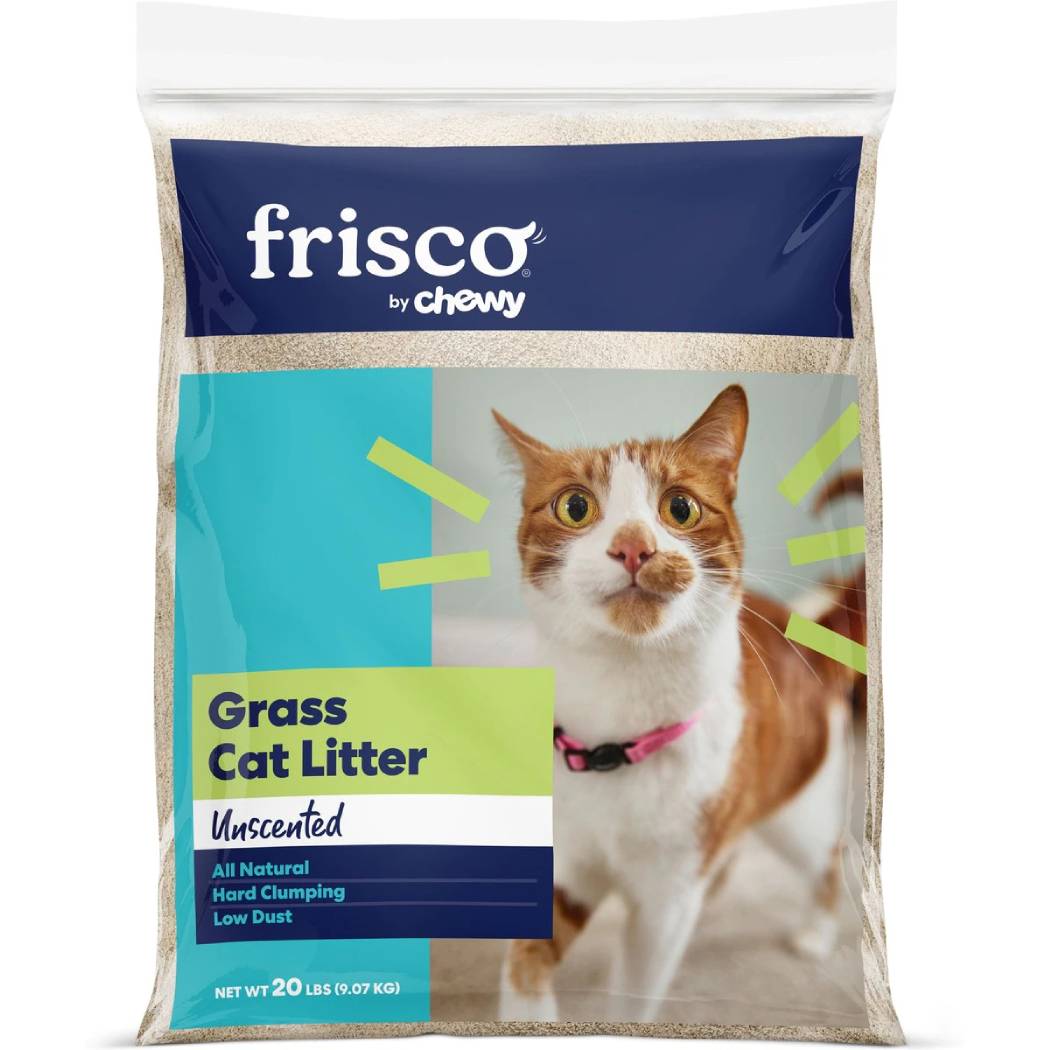
| Litter material: | Grass |
| Litter feature: | Eco-friendly |
Frisco Natural Unscented Clumping Grass Cat Litter is an all-natural, low-dust cat litter derived from 100% white sorghum grass. This cat litter offers excellent odor control and locks in absorbency using no chemicals, dyes, or fragrances. The natural grass provides a natural outdoor feel for your cat, and it comes in a resealable bag. It’s ideal for multi-cat households and clumps well for easy scooping and disposal. This cat litter offers a natural alternative to traditional cat litter for a healthier, safer option, and it’s made in the U.S.A. You can also choose scented or non-scented.
Some consumers claim this product does not contain odor very well, while others claim the opposite. This product also does not offer low tracking.
- Made from 100% white sorghum grass
- Locks absorbency
- Provides natural feel
- Clumps well
- Resealable bag
- Poor odor control
- Not a low-tracking litter
4. Feline Pine Original Non-Clumping Wood Cat Litter
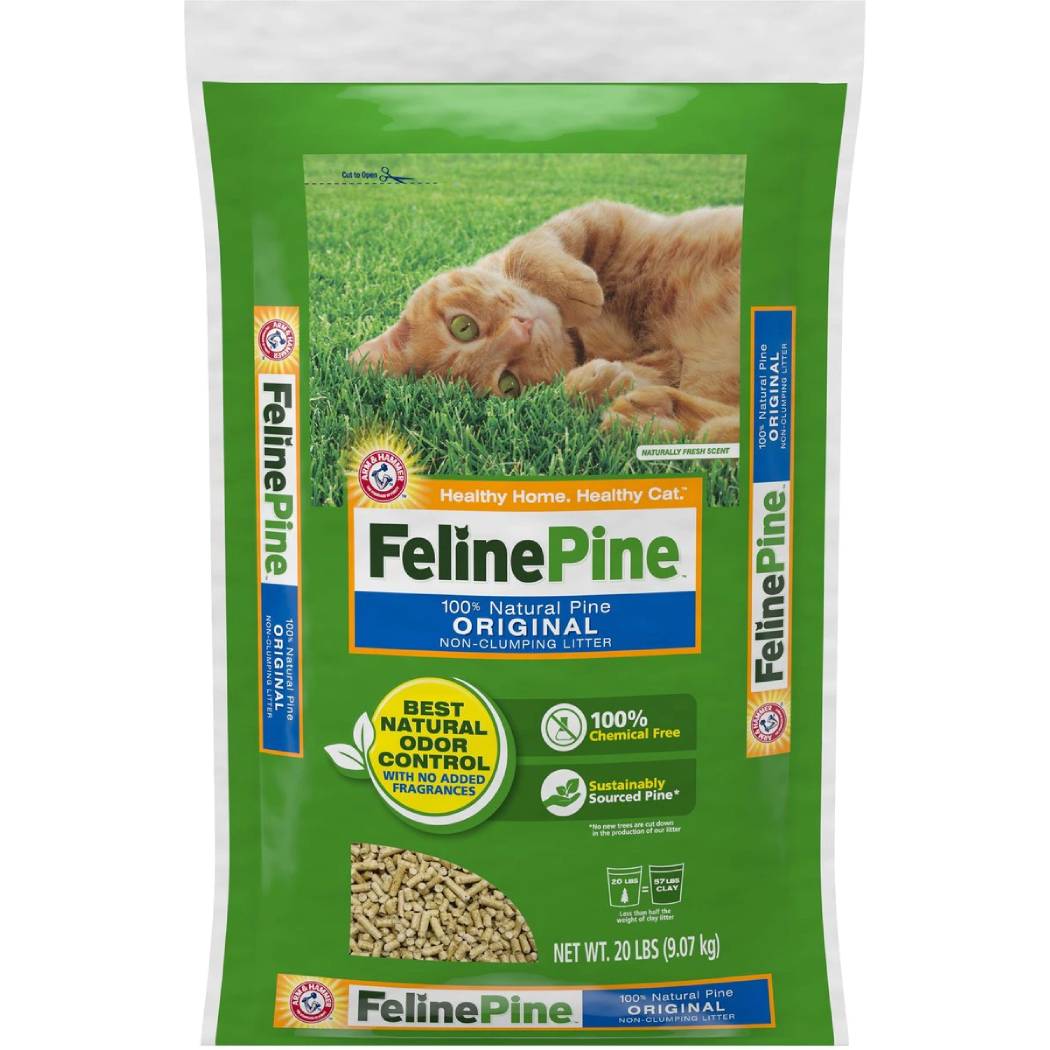
| Litter material: | Pine, wood |
| Litter feature: | Natural |
Feline Pine Original Non-Clumping Wood Cat Litter is sourced from sustainable pine shavings for an all-natural cat litter option. It’s free from artificial dyes and fragrances and uses a low-dust formula to keep dust to a minimum in the home. It offers a natural pine scent and is highly absorbent, and the texture is lightweight on your cat’s paws. It eliminates odors on contact and comes in a 7-pound, 20-pound, or 40-pound bag.
Some cat parents do not like the pellets, claiming they are hard and crunchy, making them unpleasant to their feline. The packaging is also flimsy, so be careful when opening it to prevent a mess.
- Sourced from sustainable pine shavings
- Free from artificial dyes and fragrances
- Highly absorbent
- Eliminates odors
- Lightweight texture
- Pellets are hard and crunchy
- Packaging is flimsy
5. Pidan 3-in-1 Blend Cat Litter
| Litter material: | Tofu |
| Litter feature: | Clumping |
Pidan 3-in-1 Blend Cat Litter uses 32% all-natural, sodium-based bentonite mixed with STA particles to quell odors without using artificial fragrances. It contains 25% activated carbon tofu that immediately absorbs odors on contact, making waste clump faster to prevent it from saturating the bottom of the litter box.
The last part of the blend is 40% original tofu, which is naturally water-absorbent. This eco-friendly cat litter provides a low-dust blend to keep your home’s environment clean, and it’s healthier for your cat. It also includes natural bean dregs from organic Canadian peas.
A drawback is that the material becomes wet and sticky with waste, and automatic litter boxes cannot clear it. It also does not completely knock out poop smells. Another drawback is it contains 32% sodium bentonite, so steer clear if you’re looking for a 100% sodium-free product.
- 3-in-1 blend for a natural choice
- Absorbs odors on contact
- Clumps faster
- Eco-friendly
- Material becomes wet and sticky
- No total elimination of poop smells
- Contains sodium bentonite
6. Fresh News Unscented Non-Clumping Paper Cat Litter
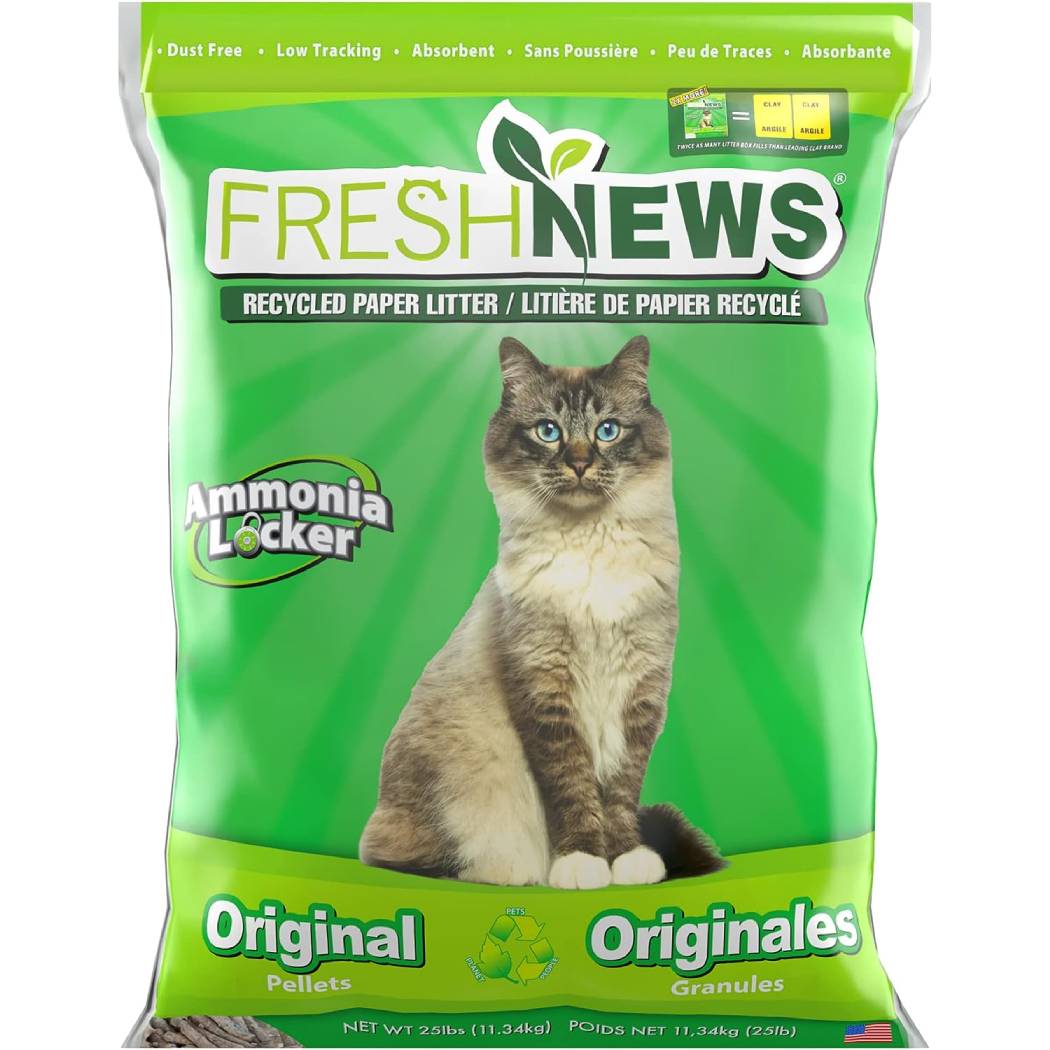
| Litter material: | Paper |
| Litter feature: | 100% non-allergenic |
Fresh News Unscented Non-Clumping Paper Cat Litter uses pellets that contain baking soda for odor control. The pellets are soft and low-tracking, keeping your kitty comfy and your home cleaner. It’s made from 100% recycled paper, producing an eco-friendly cat litter. It’s also biodegradable, 99% dust-free, and 100% non-allergenic. This litter absorbs three times more than clay, and the pellets retain their form, allowing you to see any soiled areas for scooping.
It does not control ammonia odors, which may leave behind sticky smells. The ammonia smell may also deter some cats from using it.
- 100% recycled paper
- Low-tracking litter
- Eco-friendly
- 99% dust-free
- 100% non-allergenic
- Does not control ammonia odors
- May deter some cats
7. Tidy Cats Alert Health Monitoring Unscented Non-Clumping Cat Litter
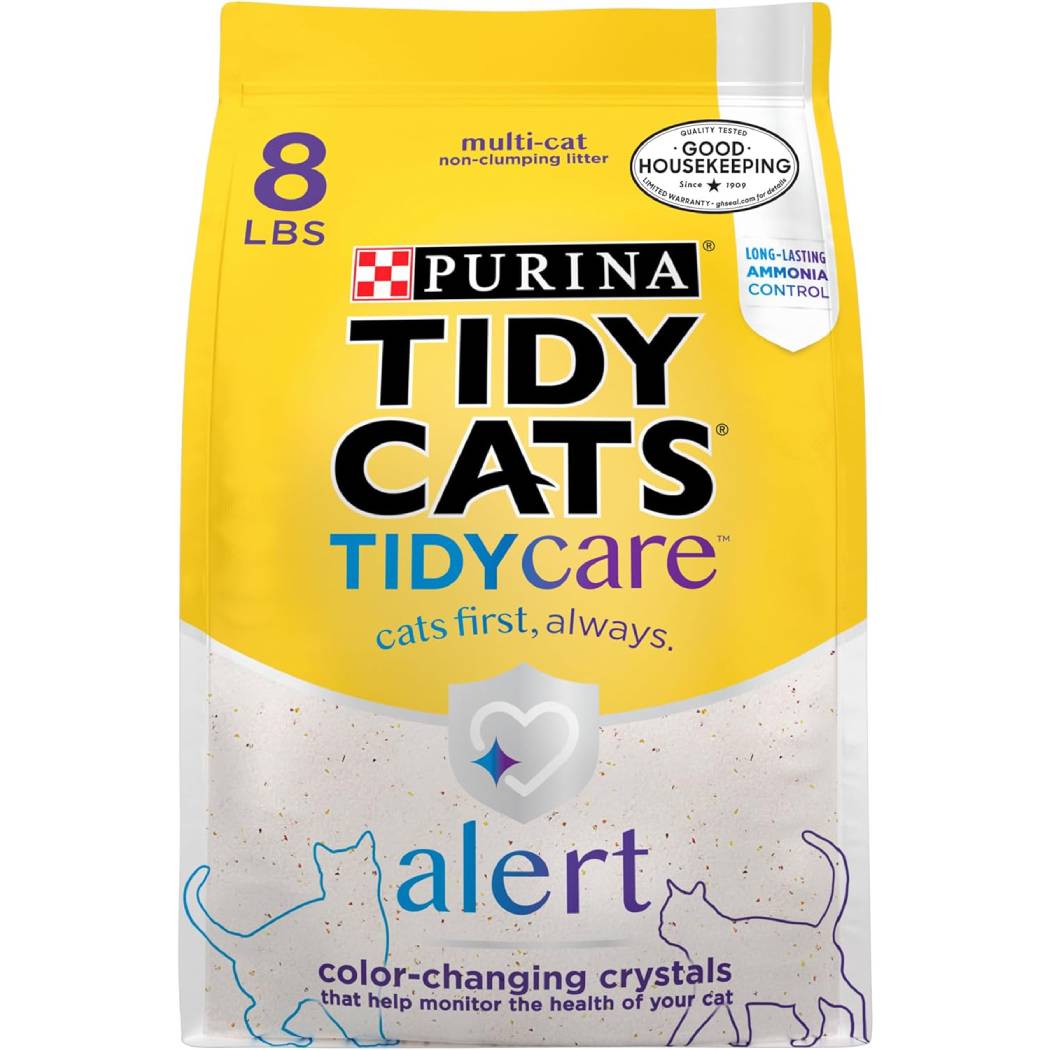
| Litter material: | Crystal |
| Litter feature: | pH detection |
Tidy Cats Alert Health Monitoring Unscented Non-Clumping Cat Litter features innovative pH-detection technology that makes the crystals change color to monitor your cat’s pH levels, which can help alert you to possible medical issues by coordinating the color in the litter box to the color-coding chart within 2 hours of waste elimination. The health monitoring crystals are made only with safe ingredients, and this litter also features ammonia control to keep the litter box smelling clean and fresh. This non-clumping litter requires little maintenance for the litter box; just scoop solids and stir. It’s lightweight, low-dust, and includes ammonia control.
Due to its unique pH detection technology, this litter is better suited for a single cat. Some cats may also not care for the texture.
Note that this cat litter is not intended to diagnose a medical issue. If you suspect a medical problem in your cat, a vet trip is necessary.
- pH-detection technology
- Ammonia control to combat odors
- Requires little maintenance
- Not useful for multiple cats
- Litter texture may be an issue
8. PrettyLitter Scented Cat Litter
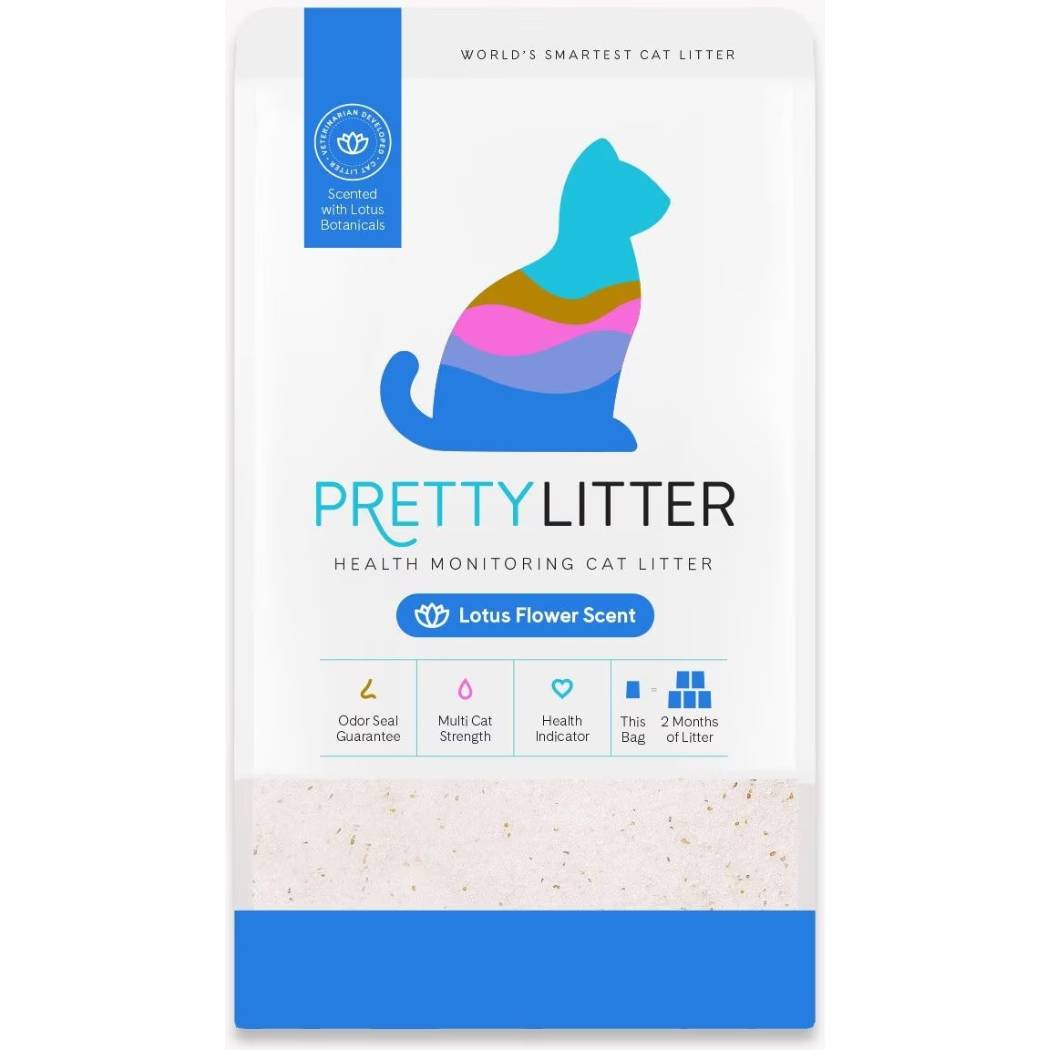
| Litter material: | Crystals |
| Litter feature: | Odor seal guarantee |
PrettyLitter Scented Cat Litter comes in an 8-pound bag that offers a 2-month supply for convenience. This litter is also armed with health monitoring abilities by changing colors to help detect a urinary tract issue, bladder issues, blood in the urine, stones, and bladder inflammation. The fine crystals offer a low-dust formula, and the litter is scented with real lotus flowers for a light, floral fragrance. The crystals are super absorbent, and you only need to scoop poop, which saves you in litter due to its non-clumping feature.
A common complaint from consumers is the litter does not do a good job of controlling odors. Despite the company’s claim, the litter may also fail to last two months.
Note that this cat litter is not intended to diagnose a medical issue. If you suspect a medical problem in your cat, a vet trip is necessary.
- Health monitoring abilities
- Low-dust formula
- Light lotus flower fragrance
- Poor odor control
- May not last 2 months
9. World’s Best Multi-Cat Unscented Clumping Corn Cat Litter
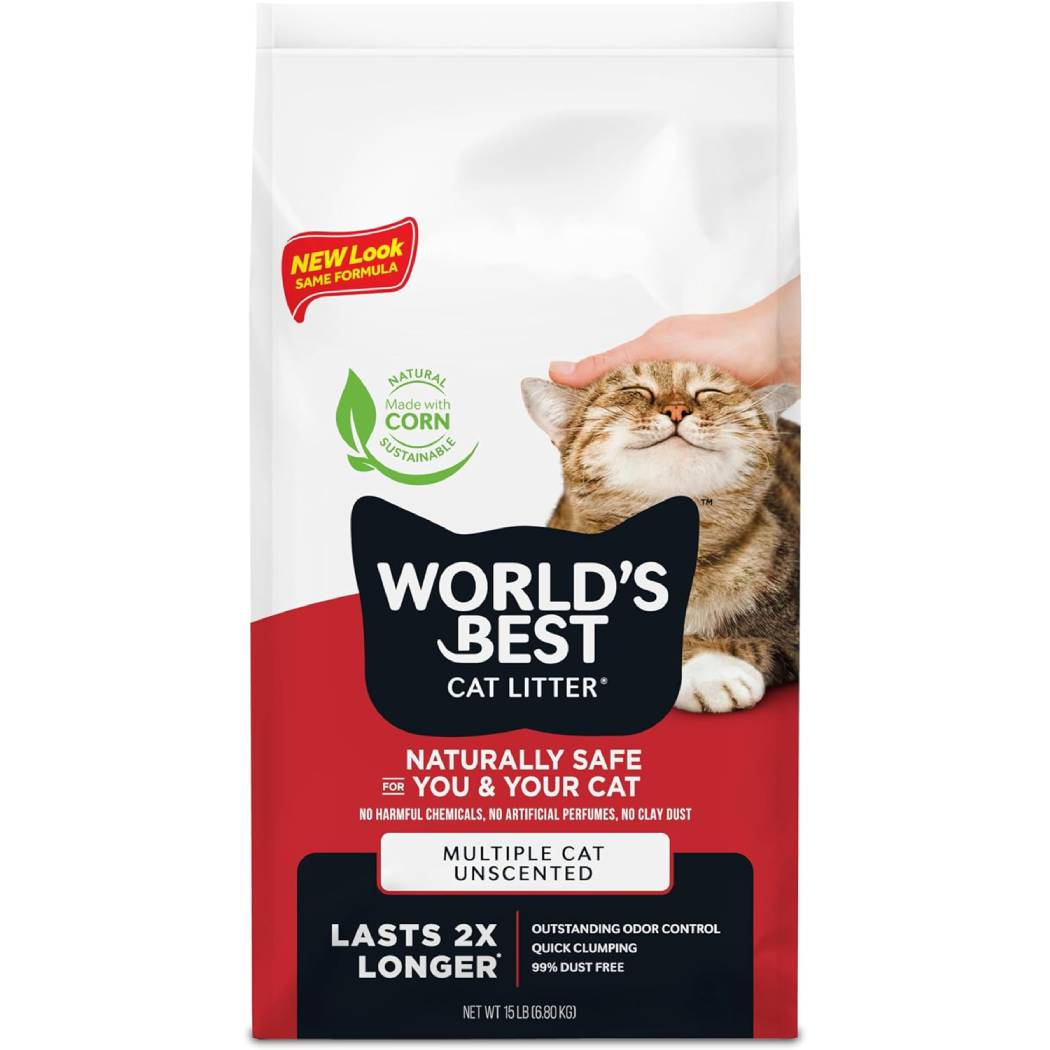
| Litter material: | Corn |
| Litter feature: | Flushable |
If you’re looking for flushable cat litter, consider World’s Best Multi-Cat Unscented Clumping Corn Cat Litter. This all-natural corn litter provides long-lasting odor control, and the formula clumps quickly for easy scooping; it’s also fully flushable and safe for most septic and sewer systems. This litter is lightweight, 99% dust-free, and 100% free from harmful chemicals and artificial fragrances. This multi-cat formula is designed for two or more cats due to the added all-natural plant derivative for enhanced odor control. It also works well with automated litter boxes.
Some consumers are unhappy with this litter’s clumping abilities; others claim the corn smell is too strong.
- Made from all-natural corn
- Flushable
- Ideal for multi-cat households
- Works with automated litter boxes
- Poor clumping
- Strong corn smell
10. sWheat Scoop Multi-Cat Natural Clumping Wheat Cat Litter

| Litter material: | Wheat |
| Litter feature: | Plant-based |
sWheat Scoop Multi-Cat Natural Clumping Wheat Cat Litter uses wheat sourced from regional U.S.A. farms to produce a natural, unscented clumping litter. It contains odor-neutralizing enzymes to quickly eliminate smells to keep your home from reeking of kitty cats, and it contains no chemicals, dyes, or perfumes. This natural plant-based litter is virtually dust-free and excellent for the environment. It also minimizes tracking to keep your home clean.
Even though the litter is unscented, consumers claim the litter stinks shortly after waste hits it. You’ll also need to scoop waste relatively quickly or else the waste hardens to a cement texture, making it hard to dispose of.
- Plant-based litter
- Odor-neutralizing enzymes
- Virtually dust-free
- Wheat sourced from U.S. farms
- Litter stinks quickly after waste elimination
- Waste hardens to cement quickly
Buyer’s Guide: How to Choose a Non-Clay Cat Litter
Is Non-Clay Litter a Safer Option?
As we mentioned at the beginning of this article, some people are concerned about using clay litter due to the added sodium bentonite. Sodium bentonite is a natural clay that swells 15 times its normal size when moisture hits it, allowing the cat owner to scoop the waste from the litter box easily. While manufacturers of clay litter claim that it’s perfectly safe for cats and humans, others are skeptical and choose a more natural approach. Given there is no concrete evidence disputing either side, it’s left up to the owner to decide what’s best for them and their beloved feline.
Put it this way: If you’re concerned about using clay litter, you have many natural options to choose from. Keep in mind that all have pros and cons, and you may need to try out a few non-clay cat litters before you find one that works best. Hopefully, our suggestions will help you decide. Before you choose, let’s discuss other materials as opposed to clay that you’ll find in our reviews above.
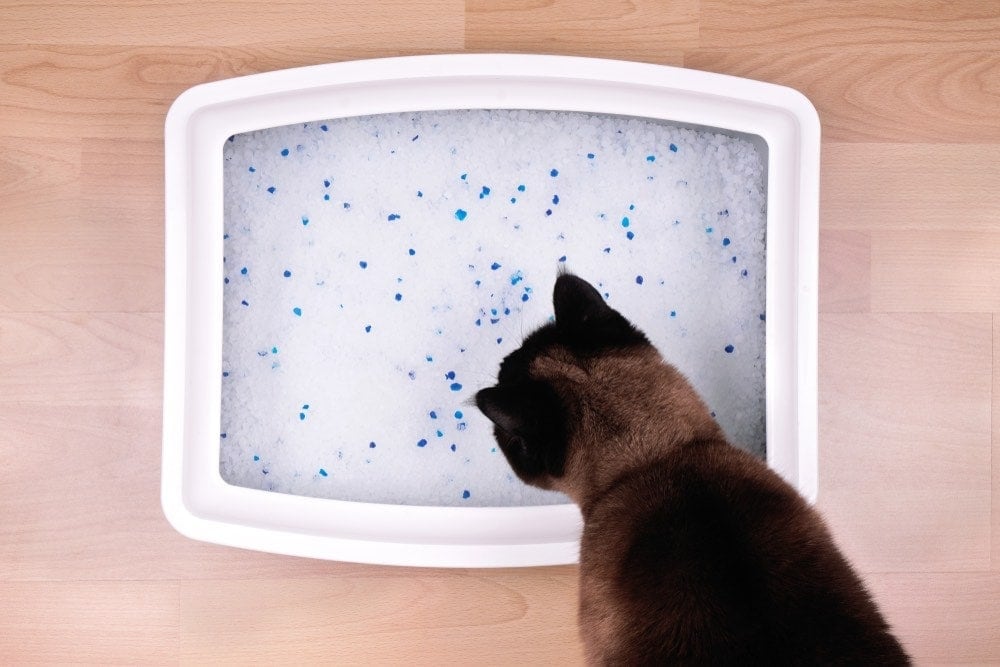
Alternative Materials to Clay Litter
Paper
Paper cat litter gives off very little dust, which is a huge plus. Paper litter is also eco-friendly and derived from recycled paper. It typically comes in two forms: pellets or fine granules. It’s also lightweight and prevents tracking, which is another huge plus among many cat owners.
Paper litter has some cons, such as not controlling odor very well and its incompatibility for use in automatic litter boxes. Paper litter also makes cleaning the litter box harder, and if left in the litter box, it takes on a mushy texture.
Wheat and Corn Cat Litter
Corn and wheat cat litter do not contain sodium bentonite and are all-natural cat litter products. These litters do not track too much, and they do a pretty good job of odor control. A potential con is that the ingredients may be contaminated with herbicides. Mold growth is also possible if not changed regularly, which can take more chunks from your wallet due to the need to keep plenty of litter handy. Some people may also be intolerant to the earthy smell.
Pine/Wood
Pine and wood cat litter give off a natural pine smell, which provides natural odor control. It is low-dust, non-toxic, affordable, and offers low-tracking. However, some cons are the texture may be uncomfortable for your cat, and the litter box may be tougher to clean with these types of litter.
Crystal (Silica)
Crystal cat litter has gained popularity in recent years for its low maintenance, excellent odor control, and superb absorbency. It also gives off very little dust and offers a more hygienic option for your kitty. However, it has a few cons. For one, crystal cat litter is not biodegradable, deeming it non-eco-friendly. It tracks easily and has a potentially uncomfortable texture for cats. It’s also more expensive.
Even the best cat litter can quickly start smelling bad. To avoid the expense and inconvenience of constantly replacing your litter, you can try a great litter additive like Hepper's Advanced Bio-Enzyme Cat Litter Deodorizer, a natural product that uses bio-enzymes to neutralize odors.
This deodorizer works on all types of litter and won't disrupt your cat's litter box habits. At Catster, we’ve admired Hepper for many years and decided to take a controlling ownership interest so that we could benefit from the outstanding designs of this cool cat company!

Conclusion
Now that you’ve had a look at some of our top reviews, we hope we have made it easier for you to pick a non-clay litter for your furry friend.
For the best overall non-clay litter, Kitty Poo Club offers a subscription service along with a few all-natural cat litter options ranging from silica, corn, wheat, organic soy, and clay. These litters are low-tracking, biodegradable, anti-microbial, hypoallergenic, and non-clumping. The company also offers disposable cat litter boxes, cat food, and supplies. For the best value, Fresh Step Fresh Scented Non-Clumping Crystal Cat Litter is lightweight, low-dust, absorbent, and provides odor control.
Regardless of which option you go with, we wish you much luck in your search and hope our reviews help you decide which non-clay cat litter is best for your needs.
Featured Image Credit: Oleg Opryshko, Shutterstock
Contents
- A Quick Comparison of Our Favorites in 2024
- The 10 Best Non-Clay Cat Litters
- 1. Kitty Poo Club – Best Overall
- 2. Fresh Step Fresh Scented Non-Clumping Crystal Cat Litter – Budget Buy
- 3. Frisco Natural Unscented Clumping Grass Cat Litter
- 4. Feline Pine Original Non-Clumping Wood Cat Litter
- 5. Pidan 3-in-1 Blend Cat Litter
- 6. Fresh News Unscented Non-Clumping Paper Cat Litter
- 7. Tidy Cats Alert Health Monitoring Unscented Non-Clumping Cat Litter
- 8. PrettyLitter Scented Cat Litter
- 9. World’s Best Multi-Cat Unscented Clumping Corn Cat Litter
- 10. sWheat Scoop Multi-Cat Natural Clumping Wheat Cat Litter
- Buyer’s Guide: How to Choose a Non-Clay Cat Litter
- Conclusion

